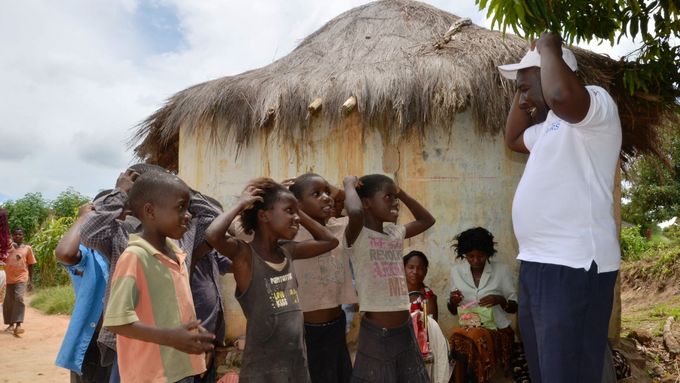World Malaria Day 2020: Urgent Action Is Critical to Save Lives
25.04.2020
This year's World Malaria Day is marked by major advances in the fight against malaria, with more than 7 million lives saved and over 1 billion cases prevented in the last two decades. At the same time, COVID-19 threatens this progress and immediate action is required to save lives. According to a model calculation, an increase of 105,000 malaria deaths, mainly children, is predicted due to COVID-19.

The WHO warns against restricting life-saving measures such as malaria prevention in the current COVID-19 crisis. (Photo: Laura McCarty for Swiss Malaria Group)
Current investments in the fight against malaria save more than 600,000 lives and prevent 100 million cases per year. The overburdening of health systems caused by COVID-19 poses the risk of a massive increase in malaria infections and deaths. This was already the case during the Ebola outbreak of 2014-2016 in West Africa when mortality from prevalent diseases rose rapidly: malaria by 50%, HIV by 15%, tuberculosis by 60% and maternal mortality by 75%.
According to the World Health Organization (WHO), over 400,000 people die of malaria every year. Based on a model calculation from the Swiss Tropical and Public Health Institute (Swiss TPH), the COVID-19 crisis will lead to an additional 105,000 malaria deaths this year, predominantly children.
This significant increase in deaths is primarily based on the lack of mass distribution of insecticide-treated mosquito nets during one year and secondly on the assumption of 50% less access to competent treatment due to the closure of health centers and hospitals. These two factors together result in 16% more malaria infections and 26% more deaths.
A renewed increase of this preventable and treatable disease must be averted. In order to stop another surge of infections, global measures to contain COVID-19 must go hand in hand with saving human lives from malaria.
Disrupted supply chains for antimalarial drugs
Global action against COVID-19 is now needed to protect health systems and ensure they continue to function for the population. At the same time, these measures must not restrict access to life-saving prevention, diagnosis and treatment of major diseases such as HIV and malaria, nor slow down the progress gained over the years. WHO has already reported disruptions in the supply chains for key antimalarial products - such as long-lasting mosquito nets, rapid diagnostic tests and antimalarial drugs - due to the blocking and suspension of imports and exports of goods and the redeployment of some antimalarials in response to the COVID-19 pandemic. The Swiss Malaria Group, together with the internationally united actors of the RBM Partnership to End Malaria, is therefore calling for action to end malaria:
- We must protect the lives of the most vulnerable - especially those of pregnant women and children under the age of 5 in malaria-affected countries, provide life-saving tools to fight malaria and ensure access to treatment.
- To do this, we must close the annual funding gap of USD 2 billion for malaria.
- Stronger health systems are our first line of defense in the fight against existing and emerging diseases.
- We need to invest in the development and expansion of innovative tools and technologies to help us counter malaria and other deadly diseases.
Switzerland's central commitment
Professor Christian Lengeler, President of the Swiss Malaria Group and malaria expert at the Swiss Tropical and Public Health Institute (Swiss TPH), adds: "An important lesson to be learned from this exceptional situation is that prevalent diseases do not suddenly stop when a new epidemic breaks out, nor do they stop at national borders. Only by working together can we end malaria and overcome new threats to global public health such as COVID-19".
As the headquarters of large pharmaceutical companies, internationally active non-governmental organizations and strong academic research, Switzerland, with its combination of knowledge and key players, plays a crucial role in global health and a malaria-free world.
Christian Frutiger, Assistant Director General and Head of Global Cooperation at the Swiss Agency for Development and Cooperation (SDC) confirms: "Switzerland and the international community are now particularly called upon to maintain the progress made in the fight against malaria and to meet their global commitments”. He assures SDC's commitment to this and reaffirms: "The SDC, together with partners from business and research, can help save lives, build resilient health systems and create a malaria-free future in which no one is left behind".
Press contact:
Prof. Christian Lengeler, President Swiss Malaria Group: +41 (0)79 257 43 86 christian.lengeler@swisstph.ch
Carole Küng, Executive Secretary Swiss Malaria Group: +41 (0)77 447 79 46 ckueng@swissmalariagroup.ch
About the Swiss Malaria Group
The Swiss Malaria Group is a network of research, industry, federal and non-governmental organizations and is committed to Switzerland's leadership in global health and the fight against malaria.
Contact

Christian Lengeler
Professor, PhD, Prof.
Senior Scientific Project Leader
+41612848221
,
-
christian.lengeler@swisstph.ch
Stay connected
Subscribe to our newsletter and get all the latest research news, project updates, course and event listings from Swiss TPH.